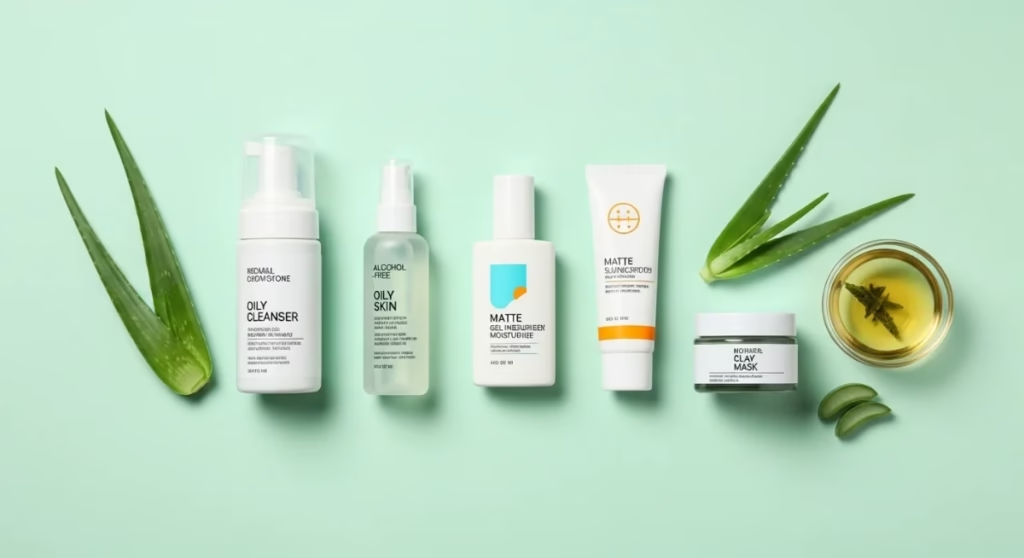Introduction: Why Oily Skin Care Routine Is Important
If you have oily skin, you’re not alone. Millions of people around the world deal with shine on the T-zone, clogged pores, and frequent acne breakouts. Oily skin happens when sebaceous glands produce excess sebum. While sebum is essential for keeping your skin hydrated, too much of it leads to greasy skin, blackheads, and blemishes.
The good news? With a proper oily skin care routine, you can control excess oil, reduce breakouts, and keep your skin looking healthy and balanced. In this comprehensive guide, we’ll cover step-by-step routines, dermatologist-recommended ingredients, natural remedies, lifestyle changes, and common mistakes to avoid.
This blog is designed for anyone struggling with oily skin who wants a clear, practical, and science-backed daily regimen.
Understanding Oily Skin
Before diving into the routine, it’s important to understand why oily skin occurs.
Causes of Oily Skin
- Genetics – If your parents have oily skin, chances are you will too.
- Hormonal fluctuations – Common during puberty, menstrual cycles, or stress.
- Climate – Hot and humid weather can increase oil production.
- Wrong skincare products – Using heavy creams or harsh cleansers can worsen oiliness.
- Diet and lifestyle – Excess sugar, fried foods, and stress often contribute to oil imbalance.
Benefits of Oily Skin
Interestingly, oily skin isn’t all bad. It tends to age slower than dry skin because natural oils protect against fine lines and wrinkles. With the right care, oily skin can look youthful and radiant for years.
Step-by-Step Oily Skin Care Routine
1. Cleansing
Cleansing is the foundation of oily skin care.
- Use a mild foaming or gel-based cleanser with salicylic acid or tea tree oil.
- Wash your face twice daily—morning and evening.
- Avoid over-washing, as it strips natural oils and triggers more oil production.
2. Toning
A toner helps balance skin’s pH and tightens pores.
- Use an alcohol-free toner with witch hazel, rose water, or green tea.
- Apply with a cotton pad or spritz directly onto the skin.
- Helps refresh and prep the skin for moisturizer.
3. Moisturizing
Even oily skin needs hydration. Skipping moisturizer often leads to more oiliness.
- Choose oil-free, water-based, or gel moisturizers.
- Look for ingredients like hyaluronic acid and glycerin.
- Apply twice daily after cleansing and toning.
4. Sun Protection
Sunscreen is non-negotiable.
- Choose a broad-spectrum SPF 30+ sunscreen.
- Look for matte-finish, lightweight formulas labeled “non-comedogenic.”
- Apply every morning and reapply every 2–3 hours if outdoors.
5. Exfoliation
Exfoliation prevents clogged pores and dullness.
- Exfoliate 1–2 times per week.
- Use gentle chemical exfoliants like salicylic acid or glycolic acid.
- Avoid harsh scrubs that damage skin.
6. Weekly Treatments
- Clay masks: Absorb excess oil and impurities.
- Sheet masks: Choose ones with green tea, aloe vera, or niacinamide for calming effects.
Day vs Night Oily Skin Care Routine
Day Routine
- Gentle foaming cleanser
- Alcohol-free toner
- Lightweight moisturizer
- Sunscreen with SPF 30+
Night Routine
- Cleanser to remove dirt and makeup
- Balancing toner
- Gel-based moisturizer or oil-free night cream
- Overnight serum with niacinamide or retinol
Natural Remedies for Oily Skin
Home remedies can be an effective addition to your routine.
- Aloe Vera Gel: Hydrates skin without clogging pores. Apply a thin layer at night.
- Honey Mask: Natural antibacterial properties reduce acne and balance oil.
- Green Tea: Acts as an antioxidant toner and helps regulate sebum.
- Multani Mitti (Fuller’s Earth): Clay mask that absorbs excess oil and gives a cooling effect.
- Lemon Juice (diluted): Helps tighten pores but should be used sparingly.
Lifestyle Tips for Managing Oily Skin
Skincare products are only part of the solution. Your lifestyle also plays a major role.
- Drink at least 8–10 glasses of water daily.
- Eat a balanced diet with fewer fried and sugary foods.
- Sleep for 7–8 hours to allow your skin to repair itself.
- Exercise regularly to improve blood circulation and skin health.
- Manage stress with yoga, meditation, or simple breathing exercises.
Common Mistakes People Make in Oily Skin Care
- Over-washing: Strips natural oils, causing rebound oiliness.
- Skipping moisturizer: Leads to dehydration and more oil production.
- Using alcohol-based products: Dries skin and worsens oil problems.
- Ignoring sunscreen: Increases damage, pigmentation, and breakouts.
- Over-exfoliating: Causes irritation and sensitivity.
Dermatologist-Recommended Ingredients for Oily Skin
If you’re shopping for products, check the ingredient list. These are highly recommended:
- Niacinamide: Reduces oil production and minimizes pores.
- Salicylic Acid: Exfoliates pores and prevents acne.
- Hyaluronic Acid: Provides hydration without greasiness.
- Retinol: Improves texture and reduces acne scars when used at night.
- Clay (Kaolin or Bentonite): Absorbs excess oil effectively.
Frequently Asked Questions (FAQs)
1. Should oily skin be moisturized?
Yes. Without moisturizer, your skin produces even more oil. Use a gel-based, oil-free moisturizer.
2. How often should I wash my face?
Twice a day is enough. Washing more often can trigger excess oil.
3. What is the best sunscreen for oily skin?
A non-comedogenic, matte-finish sunscreen with SPF 30 or higher.
4. Can oily skin use retinol?
Yes, retinol regulates oil production and improves skin texture when used at night.
5. Are home remedies safe for oily skin?
Most are safe, but patch test before using. Avoid lemon juice in high concentration.
6. Does oily skin mean I’ll have more acne?
Not necessarily. With proper care and hygiene, oily skin can remain clear.
7. What foods should I avoid for oily skin?
Reduce intake of fried foods, sugary snacks, and dairy, which can trigger breakouts.
Final Thoughts
Managing oily skin requires consistency and balance. An effective oily skin care routine focuses on cleansing, hydrating, protecting, and treating the skin with the right products. Adding natural remedies and maintaining a healthy lifestyle enhances results. Remember, the goal isn’t to eliminate oil completely but to control it so that your skin stays clear, radiant, and youthful.
Oily skin, when cared for properly, can actually age slower and look healthier in the long run. Stick to a simple, effective routine, and your skin will thank you.
Read Also : Tattoo Aftercare: Fast Healing & Vibrant Ink Tips







